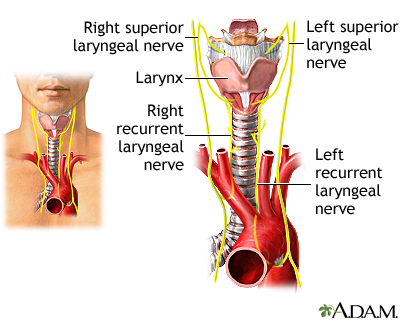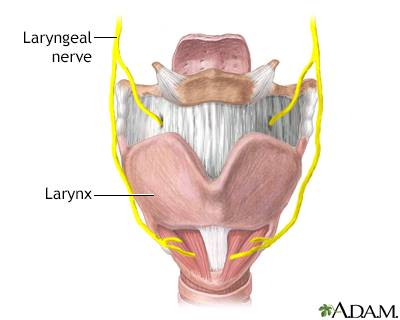Laryngeal nerve damage
Definition
Laryngeal nerve damage is injury to one or both of the nerves that are attached to the voice box.
Alternative Names
Vocal cord paralysis
Causes
Injury to the laryngeal nerves is uncommon.
When it does occur, it can be from:
- A complication of neck or chest surgery (especially thyroid, lung, heart surgery, or cervical spine surgery)
- A breathing tube in the windpipe (endotracheal tube)
- A viral infection that affects the nerves
- Tumors in the neck or upper chest, such as thyroid or lung cancer
- Part of a neurological condition
- Neck or chest trauma
Symptoms
Symptoms include:
- Difficulty speaking
- Difficulty swallowing
- Hoarseness
Injury to the left and right laryngeal nerves at the same time can cause a breathing problem. This can be an urgent medical problem.
Exams and Tests
The health care provider will check to see how your vocal cords move. Abnormal movement may mean that a laryngeal nerve is injured.
Tests may include:
- Bronchoscopy
- CT scan of the chest
- Laryngoscopy
- MRI of the brain, neck, and chest
- X-ray
Treatment
Treatment depends on the cause of the injury. In some cases, no treatment may be needed and the nerve may recover on its own. Voice therapy is useful in some cases.
If surgery is needed, the goal is to change the position of the paralyzed vocal cord to improve the voice. This can be done with:
- Arytenoid adduction (stitches to move the vocal cord toward the middle of the airway)
- Injections of collagen, Gelfoam, or another substance
- Thyroplasty
If both the left and right nerves are damaged, a hole may need to be cut into the windpipe (tracheotomy) right away to allow breathing. This is followed by another surgery at a later date.
Outlook (Prognosis)
The outlook depends on the cause of the injury. In some cases, the nerve rapidly returns to normal. However, sometimes the damage is permanent.
When to Contact a Medical Professional
Call your provider if you have:
- Difficulty breathing (call right away)
- Unexplained hoarseness that lasts for more than 3 weeks
Gallery


References
Dexter EU. Perioperative care of the thoracic surgical patient. In: Sellke FW, del Nido PJ, Swanson SJ, eds. Sabiston and Spencer Surgery of the Chest. 9th ed. Philadelphia, PA: Elsevier; 2016:chap 4.
Nouraei SAR, Sandhu GS. Laryngeal and esophageal trauma. In: Flint PW, Francis HW, Haughey BH, et al, eds. Cummings Otolaryngology: Head and Neck Surgery. 7th ed. Philadelphia, PA: Elsevier; 2021:chap 66.
Woodson G. Pathophysiology of recurrent laryngeal nerve injury. In: Randolph GW, ed. Surgery of the Thyroid and Parathyroid Glands. 3rd ed. Philadelphia, PA: Elsevier; 2021:chap 42.
